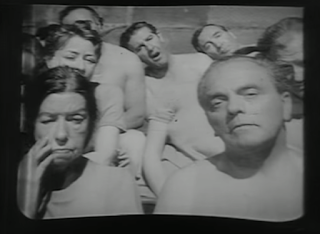** minor spoilers only **
I see good and bad here, much of it stemming from Martin Scorsese's status as Hollywood elder. The bad news: at the end, candles are placed on the dead after the draft riots, so survivors can identify loved ones. The problem: the scene is lit such that candles wouldn't be necessary (on the DVD). Judging from Scorsese's progressively impersonal output, he's lost the will to defy industry SOP. Gangs of New York mostly ignores the overcrowding, debilitation, vermin and stench that prevailed in slums of the era (if not today's).
At the same time, Scorsese had the pull to deliver a star-filled epic about an historical period usually avoided (even so, the film was shot in Rome, with both Scorsese and Leonardo DiCaprio reportedly taking reduced salaries). The ethnic and regional divisions of the 19th century remain, thus the appeal of the Western, which skirts the issues, and Civil War films that flirt with "Lost Cause" Confederate nostalgia.
While it may simplify local history,
Gangs of New York implies a disturbing truth: at one time in America, white supremacy was inclusive, it was multiculturalism. (The film gestures anti-racism, but partly for our sensibilities.)
Divisions between Euro-American groups threatened to tear New York City -- tear the nation -- apart. The U.S. stayed united by exalting whiteness (as do Lost Cause movies). Of course, American racism held other benefits, especially free or cheap labor. Today, white supremacy as national identity seems pathological, like losing weight by smoking cigarettes. Still, it's our history, its legacy unresolved.
I see good and bad here, much of it stemming from Martin Scorsese's status as Hollywood elder. The bad news: at the end, candles are placed on the dead after the draft riots, so survivors can identify loved ones. The problem: the scene is lit such that candles wouldn't be necessary (on the DVD). Judging from Scorsese's progressively impersonal output, he's lost the will to defy industry SOP. Gangs of New York mostly ignores the overcrowding, debilitation, vermin and stench that prevailed in slums of the era (if not today's).
At the same time, Scorsese had the pull to deliver a star-filled epic about an historical period usually avoided (even so, the film was shot in Rome, with both Scorsese and Leonardo DiCaprio reportedly taking reduced salaries). The ethnic and regional divisions of the 19th century remain, thus the appeal of the Western, which skirts the issues, and Civil War films that flirt with "Lost Cause" Confederate nostalgia.
While it may simplify local history,
Gangs of New York implies a disturbing truth: at one time in America, white supremacy was inclusive, it was multiculturalism. (The film gestures anti-racism, but partly for our sensibilities.)
Divisions between Euro-American groups threatened to tear New York City -- tear the nation -- apart. The U.S. stayed united by exalting whiteness (as do Lost Cause movies). Of course, American racism held other benefits, especially free or cheap labor. Today, white supremacy as national identity seems pathological, like losing weight by smoking cigarettes. Still, it's our history, its legacy unresolved.









